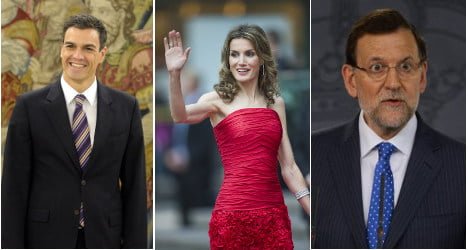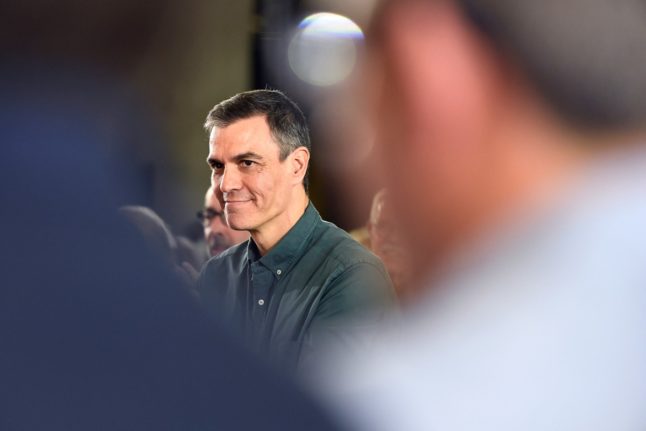POLITICS
A to Z of Spanish politics: a handy guide
In this Spanish politics cheat sheet, The Local Spain gives you the heads up on everyone from Aznar to Zapatero, stopping at (almost) all stations in between.
Published: 6 March 2013 14:15 CET

The leader of Spain's socalist PSOE party Pedro Sánchez (left), Queen Letizia and Spanish Prime Minister Mariano Rajoy. Photos: AFP
A is for Esperanza Aguirre. Aguirre is president of Spain's ruling Popular Party (PP, see below) in Madrid, and was also the President of Madrid itself until ill health forced her to quit the role in 2012. A heavyweight in the party despite her lack of a front line role, her opinion is listened to by all.
A is for José María Aznar. Aznar was the first Popular Party (PP) prime minister of Spain, after a long period of socialist rule. He was Spain's prime minister from 1996 to 2004 and is still highly influential in party circles.
B is for Luis Bárcenas (aka Luis el Cabrón, or Luis the Bastard). Bárcenas was the Popular Party's (see below) treasurer for many years. He is currently being investigated for tax fraud and allegedly running a slush fund for the party. He had millions of euros stashed away in Europe, and is currently in prison for alleged involvement in another long-running corruption scandal — the so-called Guertel Case.
B is also for Ana Botella, the current Popular Party (PP) mayor of Madrid. She is also the wife of José Maria Aznar, the former Popular Party president of Spain (see above). During a press conference for Madrid’s bid for the 2020 Olympic Games, she struggled to answer a journalist’s question in English, prompting mockery by the Spanish media.
B is also for BNG, or Bloque Nacionalista Galego. This is the left-wing coalition of Galician nationalist parties. They won 10 percent in their latest regional election. Their leader is Xavier Vence.
C is for Catalonia. Home to some 7.5 million people, the Spanish region of Catalonia is an economic powerhouse. It also has its own language (Catalan), history, and culture. Critically, Catalonia is also involved in a long-running battle with the national government of Madrid over the redistribution of tax from the region, among other issues. Regional leader Artur Mas (see below) has called for a unilateral non-binding 2014 poll in the region on the issue of independence from the rest of Spain — a move that Madrid has ruled illegal. The battle lines are drawn. Stay tuned!
C is also for Convergéncia i Unió (CiU), or Convergence and Union. This is the ruling Catalan nationalist coalition. It is made up of the larger Democratic Convergence of Catalonia (CDC) and the Democratic Union of Catalonia. Coalition leader Artur Mas (see below) is currently the president of the Catalan Government, and the most public figure in the region's push for independence.
C is for crisis. You can't go more than five minutes in Spain without hearing about 'la crisis'. It all began back in 2008 when Spain's property bubble burst. The latest figures show that just under 25 percent of Spaniards are unemployed, while that figure is higher than 50 percent for people aged under 25.
D is for 'desahucios' (or evictions). Figures from mid-2012 show that banks were carrying out 517 home evictions a day in Spain after people defaulted on their mortgage. This is Spain's crisis at its most brutal.
E is Esquerra Republicana de Catalunya (ERC). This is a left-wing Catalan nationalist political party, headed up by Oriol Junqueras. They won 13.7 percent if the vote in the latest regional elections. A major rival to the ruling CiU coalition (see above) in the region, they won the largest share of the vote in Catalonia in May 2014 European elections with their separatist platform.
F is for Francisco Franco, dictator of Spain from 1938 to 1973. The dapper Gallician Franco was a general in the Spanish Civil War. Throughout his rule, he remained a hard-line nationalist, opposed to the power of Spain's regions — including Catalonia (see above).
G is for Caso Gürtel. This a long-running corruption scandal involving Francisco Correa, a businessman with links to the Popular Party, particularly in Valencia and Madrid. The scandal involves possible illegal party funding and awarding of contracts. The investigative case was dubbed Gürtel, the German word for belt, in a cryptic reference to Correa, which signifies the same thing in Spanish.
H is for handouts. Former Popular Party treasurer Luis Bárcenas (see B) is suspected of giving handouts to many key figures in the Popular Party including the prime minister, Mariano Rajoy, a charge Rajoy vehemently denies.
I is for Pablo Iglesias. Iglesias, the 35-year-old head of Spain's left-wing Podemos (We can) party (see below) is a political scientist who made a name for himself as a regular participant on television debate shows.
I is also for Izquierda Unida, or United Left. This is a political coalition of left-wing groups including greens, socialists and republicans. The party leader is Cayo Lada.
J is for junta. This important word means parliament or government, as in the Junta de Andalucía, or Andalusian government.
K is for King Felipe. The very tall (1.98 metre, 6 foot 6) King Felipe was proclaimed Spain's monarch in June 2014 after the surprise abdication of his father King Juan Carlos, who, just to confuse things also still hold the title of king.
L is for Queen Letizia, Letizia, the Queen of Spain and wife of King Felipe. The royal couple have two daughters — Sofia and Leonor, who is heir to the throne.
M is Mas. Artur Mas is the controversial president of the Generalitat de Catalunya. He is also the main figure pushing for a November 9th, 2014 referendum on the issue of Catalonia's referendum from the rest of Spain — a poll the national government in Madrid says is illegal.
N is for Instituto Nóos. This is the non-profit institute jointly run by Kings Felipe's brother-in-law Iñaki Urdangarin (see below) and his colleague Diego Torres. The two men are suspected of diverting funds from the institute to accounts across Europe.
N is also for Nuevas Generaciones del Partido Popular: Nuevas Generaciones (NNGG) is the youth-wing of Spain's ruling Popular Party (see below). Headed up by Beatriz Jurado, it was in 2013 embroiled in scandal when members posed with flags from Franco-era Spain (see Francisco Franco above).
O is for Oriol Junqueras, the head of the left-wing Catalan party Esquerra Republicana de Catalunya (see above).
P is for the Popular Party (Partido Popular, or PP) and the opposition Spanish Socialist Workers' Party (PSOE, or Partido Socialista Obrero Español). These are two major parties in Spanish political life.
P is also for Podemos Headed up by Pablo Iglesias, Spain's left-wing Podemos (We Can) party were virtually unknown until they took five seats in European Elections in May 2014. Formed just months before the poll using funds raised online through crowdfunding, the party took votes from other established left-wing parties including Spain's major opposition party, the socialist PSOE (see above).
Q is for Queen Sofia of Spain. The Greek Sofia met the former king of Spain Juan Carlos on a cruise in the Greek Islands in 1954 and the two married in Athens in 1962. Queen Sofia and her husband Juan Carlos both still hold the official titles of king and queen despite Juan Carlos's abdication as head of state in June 2014.
R is for Mariano Rajoy, Mariano Rajoy is the Spanish prime minister, with Spain's ruling Popular Party (Partido Popular, or PP — see above)
S is for Pedro Sánchez: 41-year-old Sánchez is the Secretary General of Spain's largest opposition party, the PSOE. Party members hope he can bring the party back from the political wilderness after a serious of electoral humiliations. Oh, and his nickname is 'El Guapo', or 'The Handsome One'.
S is also for suits. Suits played a key role in the Caso Gürtel (see above), a long-running corruption scandal involving involving Francisco Correa, a businessman with links to the Popular Party. The suits in question were allegedly given away to Valencian politician Francisco Camps as part of a circle of favours.
T is for transition. After the death of Spanish dictator Francisco Franco in 1975, Spain lived through the so-called 'Transición'. The monarchy was reinstated after several decades in the wilderness and Spain began its move towards parliamentary democracy. A new constitution was eventually introduced in 1978.
U is for Urdangarin. Iñaki Urdangarin, married to King Felipe's sister Cristina, is embroiled in a scandal involving money he may or may not have 'diverted' from the Instituo Nóos (see above).
V is for Valencia, the Spanish region which has earned an unfortunate reputation as Spain's 'corruption capital' due to the large number of scandals to hit the region's politicians and businessmen. Former regional president Francisco Camps, for example, stepped down in 2011 after it emerged he was being investigated for his possible involvement in the complicated Gürtel affair (see 'G' above). The region is also famous for its architectural white elephants, including the ghost airport of Castellón.
X is for xunta, a variant of the world junta, meaning government or parliament, as in the Xunta de Galicia.
W is Wert. José Ignacio Wert is Spain's education minister. His ongoing campaign against the dominance of Catalan in Catalonia's classrooms hasn't won him many friends in that part of the world.
Z is for Zapatero, José Luis Rodriguez Zapatero is the ex-socialist prime minister of Spain. His party was routed in the snap elections of 2011. The party's perceived inability to deal with the country's crisis led to a 15 percent swing against it.
Url copied to clipboard!


 Please whitelist us to continue reading.
Please whitelist us to continue reading.
Member comments